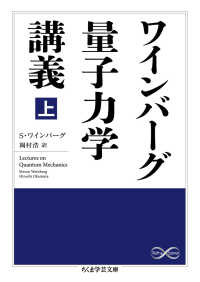- ホーム
- > 洋書
- > 英文書
- > Politics / International Relations
Full Description
Asian Americans make up the fastest growing racial group in the United States, and, as such, their votes are of intense interest to both major political parties. Historically, this diverse, pan-ethnic constituency has shown strong support for the Democratic Party, but recent election cycles have seen an increase in Asian American votes for Republican candidates.
To make sense of this trend, The Social Roots of Asian American Partisanship presents a new theory on how Asian Americans learn about American politics and develop partisan views. In contrast to existing theories rooted in familial influence and social exclusion, Tanika Raychaudhuri advances an explanation that emphasizes the crucial role of peer influence, a process that she calls "social transmission." Asian Americans, she argues, are attuned to political cues from peers in their local communities--thus attributing historical Democratic support to their settlement in liberal metropolitan areas. Drawing on a range of quantitative and qualitative evidence, including in-depth interviews, national surveys of Asian Americans, and original survey experiments, the book tests social transmission alongside alternative explanations and, where possible, considers the extent to which these explanations apply across diverse ethnic subgroups within the Asian American community.
By tracing the roots of Asian Americans' partisan preferences and identifying a new pathway of political learning among minority groups, Raychaudhuri's analysis presents important implications for understanding political behavior in immigrant communities and the future of American electoral politics.








